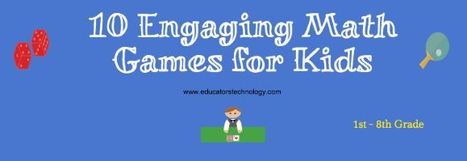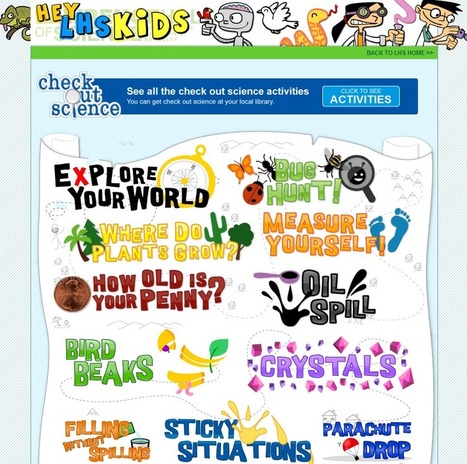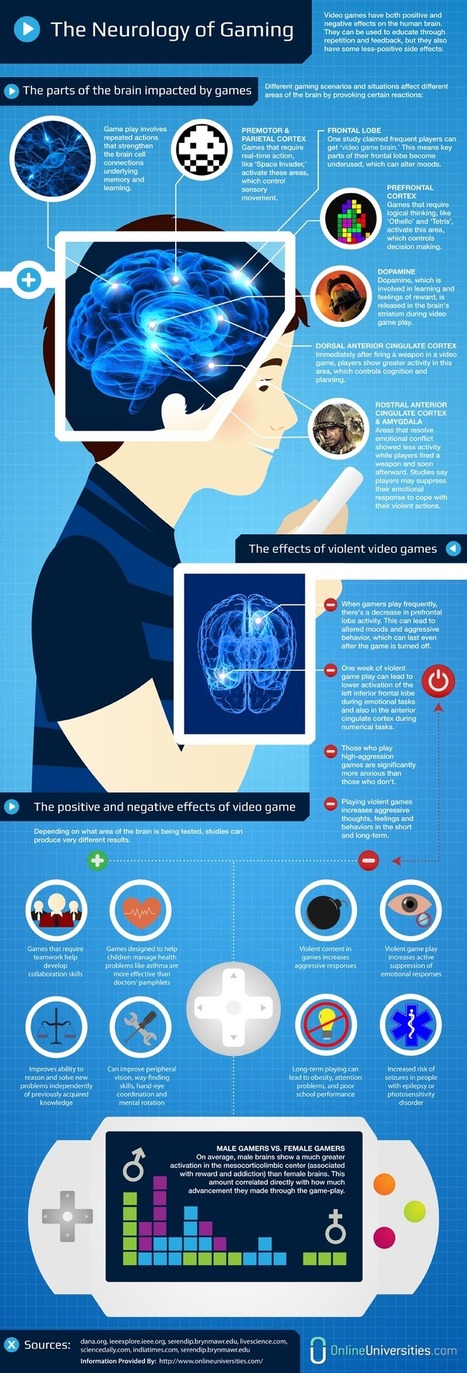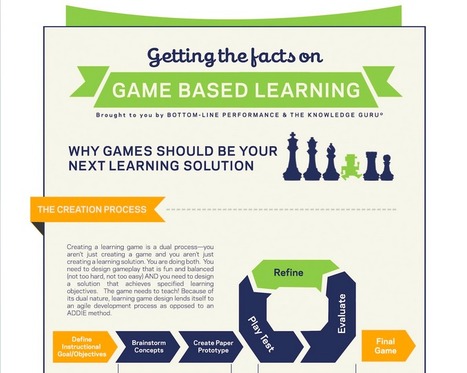Engagement enhances optimal learning and students learn best when they are actively immersed in collaborative hands-on activities. One way to get students engaged is through game-based learning. By including quality games in your class, you will get to create meaningful learning experiences that will benefit students' cognitive, social and emotional growth. In today’s post we are sharing with you this handy visual featuring some awesome skill-building math games to use with your students in class. The visual is based on Marcus Guido’s post ‘ 20 Engaging, Skill Building Math Games for Kids (1sth- 8th Grade)”. We ‘ve only included 10 games, check out the original post to learn more about other games.
Get Started for FREE
Sign up with Facebook Sign up with X
I don't have a Facebook or a X account
 Your new post is loading... Your new post is loading...
 Your new post is loading... Your new post is loading...

Sally Tilley's curator insight,
April 7, 2014 9:52 PM
What an incredibly well-sourced collation of resources...follow this immediately! Thanks so much for sharing! 
Sally Tilley's curator insight,
April 7, 2014 9:52 PM
What an incredibly well-sourced collation of resources...follow this immediately! Thanks so much for sharing!

Murray McKercher's curator insight,
December 12, 2012 10:15 AM
I think everyone agrees that male and female gamers react differently to the gaming stimulus... 
AnnC's curator insight,
December 12, 2012 10:13 PM
We need to share this info with parents so they can help their children make healthy choices regarding types and amounts of video gameplaying in which they engage. |

Oskar Almazan's curator insight,
March 14, 2017 8:21 AM
Team building games offer students fun opportunities to hone critical skills for success in the modern workplace. Students (and future employees!) that value teamwork are more motivated and creative. They’re also better at problem solving and communicating with one another and have a higher level of trust. We already know students love working in groups. Why not make a game of it?

Andrea Mejia Medina's curator insight,
March 18, 2017 12:10 AM
Critical thinking is the most important skill to develop, since in these times of information at hand, we cannot believe everything we see, read, and hear, and that is why it is important to develop this ability as it allows us to be alert and question everything that comes from these means of information. Is a skill that moves a student from concrete ideas to abstract and inferred concepts. Critical thinking allows us to analyze outcomes, compare ideas, identify parallels, sequence events, synthesize information and draw conclusions from a given body of knowledge. Whether it is the proof behind a mathematics formula or an implied tone in an essay, critical thinking skills enable students to solve problems in the real world and on exams in school. Meghan Moll (2014) suggests five tools to develop the critical thinking skills necessary for success on every high school or college test and assignment. 1. Brain games: Recently, websites dedicated to training your brain have enjoyed increased popularity. Lumosity, for example, provides games that aid in improving memory and problem-solving. From timed matching games to order sequence memorization, websites like this can aid in cognition and the ability to ask, "What is the next step?" This skill is critical to learning how to approach complex problems on standardized tests like the ACT and SAT. Rather than playing time-wasting games when you have a lull in your day, search online for brain teasers and peruse the plethora of brain games at your fingertips. 2. Logic puzzles: Before the Internet, puzzles intended to exercise your brain were published in books. Collections of crossword puzzles, logic problems, riddles, sudoku, word problems and word searches can be found at your local bookstore or library. The puzzles in these books are a wonderful strategy to activate different parts of your brain for a round or two of mental gymnastics, and many collections even discuss what each puzzle is meant to target within the mind. 3. Board games: This suggestion may seem strange at first, but do not balk. Choose board games that require more than luck – namely, strategy – for players to win. Any game where players must carefully consider their next move, recognize patterns and remember details will aid in honing critical thinking skills. Certain games like Rubik’s Cube are single-player, while others involve multiple people. Checkers, chess and Mastermind are two-player games that challenge you to plan several steps ahead. Games like Boggle and Scrabble require analyzing information quickly and formulating words, while Clue and Risk test and strengthen your ability to anticipate and react to others’ moves, as well as infer motives. 4. Journaling: Daily reflection – such as maintaining a journal – is a simple way to revisit your day, but it is also a fantastic opportunity to explore ideas. Writing encourages you to expand upon your thoughts and form connections. A journal forces you to slow down and focus on just one or two ideas at a time, which hectic schedules don't otherwise allow. Use your journal to record important ideas and questions and narratives about your life. 5. Book clubs: Students who read for understanding find it far easier to think critically than those who rush to finish. Analyzing a book requires you to delve deeper and ponder complex questions. When reading, think about why the book was written the way it was, what motivates certain characters, and how plot developments may be symbols of foreshadowing. Locate a book club to hone these skills. You will read works you otherwise may not have, and you will learn to examine character development, plot, symbolism and a whole host of other features. 3 
Character Minutes's curator insight,
May 5, 2017 12:47 PM
Great games to use with "ME Leadership" (Marks of Excellence)
Florence HENCKE's comment,
August 9, 2013 3:10 AM
Thank you for this infographic and the sources you used, the importance of having fun while learning seems to increase in education. Good news !

Ines Evaristo's curator insight,
August 21, 2013 6:53 PM
Una buena infografía que resume estudios con resultados del efecto de los videojuegos en el aprendizaje de la educacion superior, cosa que no habia visto mucho. Además, el inicio es bastante claro, hacer un videojuego "serio" o educativo es doble reto: lograr los objetivos de aprendizaje propuestos y diseñar un gameplay igualmente divertido, motivador, estimulante... es la diferencia entre un videojuego educativo de un juego didactico.
Taryn Coxall's curator insight,
October 8, 2013 10:24 PM
This article gives great insight into the upcoming phenominon of "Game Based Learning".Although i have never seen it in my practises, after reading abit about it, i believe game based learning is something i would incoperate into my own classroom. Game Based learning provides a stimulating and engaging way of learning for children on a wide range of educational areas and topics. It is proven through this approach to learning students aremore likely to become motivated to learn, become increasingly engage and excel in their learning. great resource which has iven me great insight.

Matija Sprogar's curator insight,
March 7, 2014 7:49 PM
Yeah, just leap into the first multiplayer Mario platformer set in a 3D world! Play as Mario, Luigi, Princess Peach, and Toad—each with their own special skills—in the all-new Sprixie Kingdom. At http://s.shr.lc/19obdCc |

















